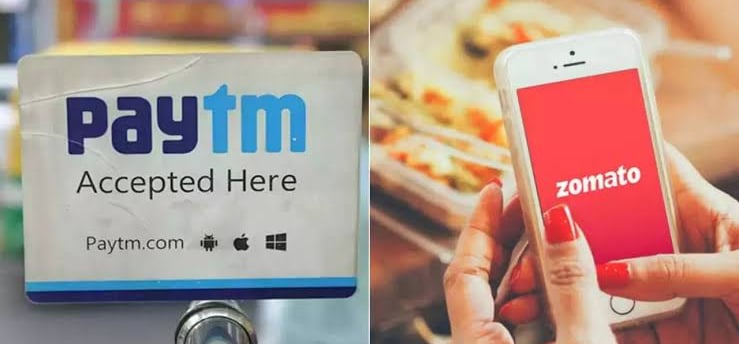Add your promotional text...
Zomato's Strategic Acquisition of Paytm’s Ticketing Business: A Game-Changer for the "Going-Out" Market
Synopsis: Zomato's recent acquisition of Paytm’s entertainment and ticketing division for ₹2,048.4 crore is a strategic move to strengthen its presence in the "going-out" sector. This deal not only expands Zomato's business beyond food delivery but also provides Paytm the opportunity to refocus on its core financial services. The market response has been mixed, and analysts offer a cautious yet optimistic outlook for both companies' future growth.
TOP STORIES
By Vishwash Saxena
8/22/20243 min read


In a strategic maneuver to solidify its footprint in the "going-out" sector, Zomato (NS:ZOMT) has announced the acquisition of Paytm's entertainment and ticketing business. This significant deal, valued at ₹2,048.4 crore or $244 million, marks a crucial step for the food delivery behemoth as it seeks to diversify its offerings beyond food delivery and strengthen its presence in the broader entertainment industry.
Paytm Shifts Focus Amid Challenges
Paytm (NS:PAYT), which has been navigating a challenging business environment, intends to refocus its efforts on its core financial services. This pivot comes as part of a broader strategy to consolidate its resources and enhance its primary business operations, especially after facing regulatory hurdles.
Following the announcement, the market reacted with mixed sentiments. On Thursday, One97 Communications, the parent company of Paytm, saw its shares surge over 5% initially, reflecting investor optimism. However, by 12:27 PM, the stock price had retraced some gains, trading 1% lower than the previous day's close. Similarly, Zomato's stock opened 1.5% higher but dipped into negative territory by 12:27 PM, down by 0.48%.
Analysts' Perspectives on Paytm's Future
From an investment standpoint, analysts are cautiously optimistic about Paytm's prospects following this divestiture. The sale is expected to bolster One97 Communications' cash reserves, potentially increasing them to approximately ₹8,100 crore. This influx of capital could be instrumental in revitalizing Paytm's payment business, which has faced headwinds, particularly after regulatory actions by the Reserve Bank of India (RBI).
However, despite the short-term financial boost, there are concerns about the long-term impact on Paytm's earnings. Analysts at Emkay Global caution that while the deal may reduce net losses for FY25, the future earnings outlook could be less favorable. They estimate that the net value addition from this deal might only increase Paytm's share price by ₹25, which is relatively modest compared to the stock's recent performance. As a result, Emkay Global has maintained a "REDUCE" rating on Paytm, with a discounted cash flow-based target price of ₹375 per share.
Moreover, the brokerage highlights that while the additional cash could be used to accelerate Paytm's cashback and rewards programs or even for strategic acquisitions, the company has not yet disclosed any concrete plans for deploying the funds. This lack of clarity suggests that the cash might simply remain on the balance sheet, generating interest income until a strategic use is identified.
Zomato's Strategic Gains and Investor Outlook
For Zomato, the acquisition of Paytm's entertainment business is poised to significantly enhance its "going-out" segment, which includes activities such as dining out, movie ticketing, and event reservations. The management is optimistic about the future potential of this newly acquired business, projecting that the gross order value (GOV) for the "going-out" division could exceed ₹10,000 crore by FY26.
Furthermore, Zomato expects the "going-out" business to approach break-even on an adjusted EBITDA basis in the medium to long term, with potential EBITDA margins of 4-5% as a percentage of GOV. In FY24, the acquired business generated a GOV of over ₹2,000 crore, with a 29% year-on-year growth, driven by the sale of 78 million tickets to over 1 million unique customers.
The business also reported revenues exceeding ₹300 crore and an adjusted EBITDA of around ₹30 crore in FY24, translating to an adjusted EBITDA margin of 1.5% as a percentage of GOV.
In the wake of this acquisition, Zomato is planning to launch a new app called "District" in the coming weeks. This app will focus on various use cases such as booking movie tickets, IPL tickets, dining-out reservations, discovering live entertainment, and booking weekend getaways. Initially, Zomato's existing "going-out" business will continue to operate on the Zomato app, while the newly acquired entertainment and ticketing services will remain on Paytm's main app, as well as Insider and TicketNew apps, for up to 12 months during the transition period. Eventually, the "District" app will integrate these services, guiding customers to consolidate their activities on the new platform.
Brokerages Weigh In on Zomato's Prospects
Zomato's acquisition has garnered positive reactions from leading brokerage firms. Emkay Global has issued a "BUY" recommendation on Zomato, with a target price of ₹270, reflecting confidence in the company's ability to leverage this acquisition for future growth.
Jefferies, another prominent brokerage, has not only reiterated its "buy" rating on Zomato but also raised the target price to ₹335. Jefferies views the acquisition as strategically sound, citing attractive valuations, projected growth, and expected margins. They note that, similar to Zomato's food delivery segment, the entertainment and ticketing business requires relatively low capital investment, suggesting a strong return on investment over the long term. Additionally, Jefferies highlights that this acquisition introduces a third distinct growth avenue for Zomato, further diversifying its business portfolio.
In conclusion, The acquisition of Paytm's entertainment and ticketing business marks a pivotal moment for both Zomato and Paytm. While Zomato stands to gain significantly by expanding its "going-out" business and diversifying its revenue streams, Paytm is poised to refocus on its core financial services, armed with a strengthened balance sheet. As the market continues to react to these developments, investors will be closely monitoring how each company executes its respective strategy in the coming months.
